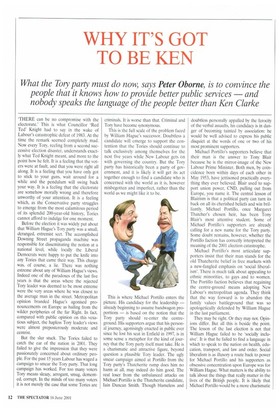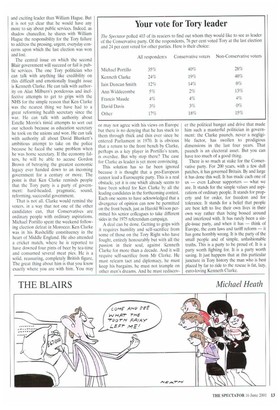WHY IT'S GOT TO BE KEN
What the Tory party must do now, says Peter Oborne, is to convince the
people that it knows how to provide better public services — and nobody speaks the language of the people better than Ken Clarke
'THERE can be no compromise with the electorate.' This is what Councillor 'Red Ted' Knight had to say in the wake of Labour's catastrophic defeat of 1983. At the time the remark seemed completely mad. Now every Tory, reeling from a second successive election disaster, understands exactly what Ted Knight meant, and more to the point how he felt. It is a feeling that the voters were at fault, and that you were right all along. It is a feeling that you have only got to stick to your guns, wait around for a while and the pendulum will swing back your way. It is a feeling that the electorate are somehow morally wrong and therefore unworthy of your attention. It is a feeling which, as the Conservative party struggles to emerge from the most calamitous period of its splendid 200-year-old history, Tories cannot afford to indulge for one moment.
Before the election it was widely put about that William Hague's Tory party was a small, deranged, extremist sect. The accomplished Downing Street propaganda machine was responsible for disseminating the notion at a national level, while locally the Liberal Democrats were happy to put the knife into any Tories that came their way. This charge was, of course, a lie. There was nothing extreme about any of William Hague's views. Indeed one of the paradoxes of the last five years is that the areas where the rejected Tory leader was deemed to be most extreme were the very areas where he was closest to the average man in the street. Metropolitan opinion branded Hague's agonised pronouncements on Europe as hailing from the wilder peripheries of the far Right. In fact, compared with public opinion on this vexatious subject, the hapless Tory leader's views were almost preposterously moderate and centrist.
But the slur stuck. The Tories failed to catch the ear of the nation in 2001. They failed to give the impression that they were passionately concerned about ordinary people. For the past 15 years Labour has waged a campaign to smear the Tory party. That long campaign has worked. For too many voters Tory means sleazy, arrogant, smug, demented, corrupt. In the minds of too many voters it is not merely the case that some Tories are criminals. It is worse than that. Criminal and Tory have become synonymous.
This is the full scale of the problem faced by William Hague's successor. Doubtless a candidate will emerge to support the contention that the Tories should continue to talk exclusively among themselves for the next five years while New Labour gets on with governing the country. But the Tory party has historically been a party of government, and it is likely it will get its act together enough to find a candidate who is concerned with the world as it is, however misbegotten and imperfect, rather than the world as we might like it to be.
This is where Michael Portillo enters the picture. His candidacy for the leadership — already beginning to assume bandwagon proportions — is based on the notion that the Tory party should re-enter the centreground. His supporters argue that his personal journey, agonisingly enacted in public ever since he lost his seat in Enfield in 1997, is in some sense a metaphor for the kind of journey that the Tory party itself must take. He is a charismatic and attractive figure, beyond question a plausible Tory leader. The ugly smear campaign aimed at Portillo from the Tory party's Thatcherite rump does him no harm at all, may indeed do him good. The real loser from the unbalanced attacks on Michael Portillo is the Thatcherite candidate, lain Duncan Smith. Though blameless and doubtless personally appalled by the ferocity of the verbal assaults, his candidacy is in danger of becoming tainted by association: he would be well advised to express his public disquiet at the words of one or two of his most prominent supporters.
Michael Portillo's supporters believe that their man is the answer to Tony Blair because he is the mirror-image of the New Labour Prime Minister. Both men, by coincidence born within days of each other in May 1953, have jettisoned practically everything they ever believed. Blair used to support union power, CND, pulling out from Europe, you name it. The central lesson of Blairism is that a political party can turn its back on all its cherished beliefs and win brilliantly. Michael Portillo, once Margaret Thatcher's chosen heir, has been Tony Blair's most attentive student. Some of Michael Portillo's supporters are already calling for a new name for the Tory party. Some doubt remains, however, whether the Portillo faction has correctly interpreted the meaning of the 2001 election catastrophe.
Michael Portillo's most articulate supporters insist that their man stands for the old Thatcherite belief in free markets with a new-fangled emphasis on 'social liberalism'. There is much talk about appealing to ethnic minorities, to gays and to women. The Portillo faction believes that regaining the centre-ground means adopting New Labour's metropolitan agenda. They think that the way forward is to abandon the family values battleground that was so apologetically defended by William Hague in the last parliament.
They may be right. Or they may not. Opinions differ. But all this is beside the point. The lesson of the last election is not that William Hague failed to be 'socially inclusive'. It is that he failed to find a language in which to speak to the nation on health, education, transport, and law and order. Social liberalism is as illusory a route back to power for Michael Portillo and his supporters as obsessive concentration upon Europe was for William Hague. What matters is the ability to talk -about the things that really matter in the lives of the Brit* people. It is likely that Michael Portillo would be a more charismatic
and exciting leader than William Hague. But it is not yet clear that he would have any more to say about public services. Indeed, as shadow chancellor, he shares with William Hague the responsibility for the Tory failure to address the pressing, urgent, everyday concerns upon which the last election was won and lost.
The central issue on which the second Blair government will succeed or fail is public services. The one Tory politician who can talk with anything like credibility on this difficult and emotionally fraught issue is Kenneth Clarke. He can talk with authority on Alan Milburn's ponderous and ineffective attempts to get to grips with the NHS for the simple reason that Ken Clarke was the nearest thing we have had to a great reforming health secretary since the war. He can talk with authority about Estelle Morris's timid attempts to sort out our schools because as education secretary he took on the unions and won. He can talk with authority all about David Blunkett's ambitious attempt to take on the police because he faced the same problem when he was home secretary. If the economy falters, he will be able to accuse Gordon Brown of betraying the greatest economic legacy ever handed down to an incoming government for a century or more. The point is that Ken Clarke reminds people that the Tory party is a party of government: hard-headed, pragmatic, sound, reforming, successful government.
That is not all. Clarke would remind the voters, in a way that not one of the other candidates can, that Conservatives are ordinary people with ordinary aspirations. Michael Portillo spent the weekend following election defeat in Morocco; Ken Clarke was in his Rushcliffe constituency in the heart of Middle England. He also attended a cricket match, where he is reported to have downed four pints of beer by tea-time and consumed several meat pies. He is a solid, reassuring, completely British figure, The great thing about him is that you know exactly where you are with him. You may



































































 Previous page
Previous page